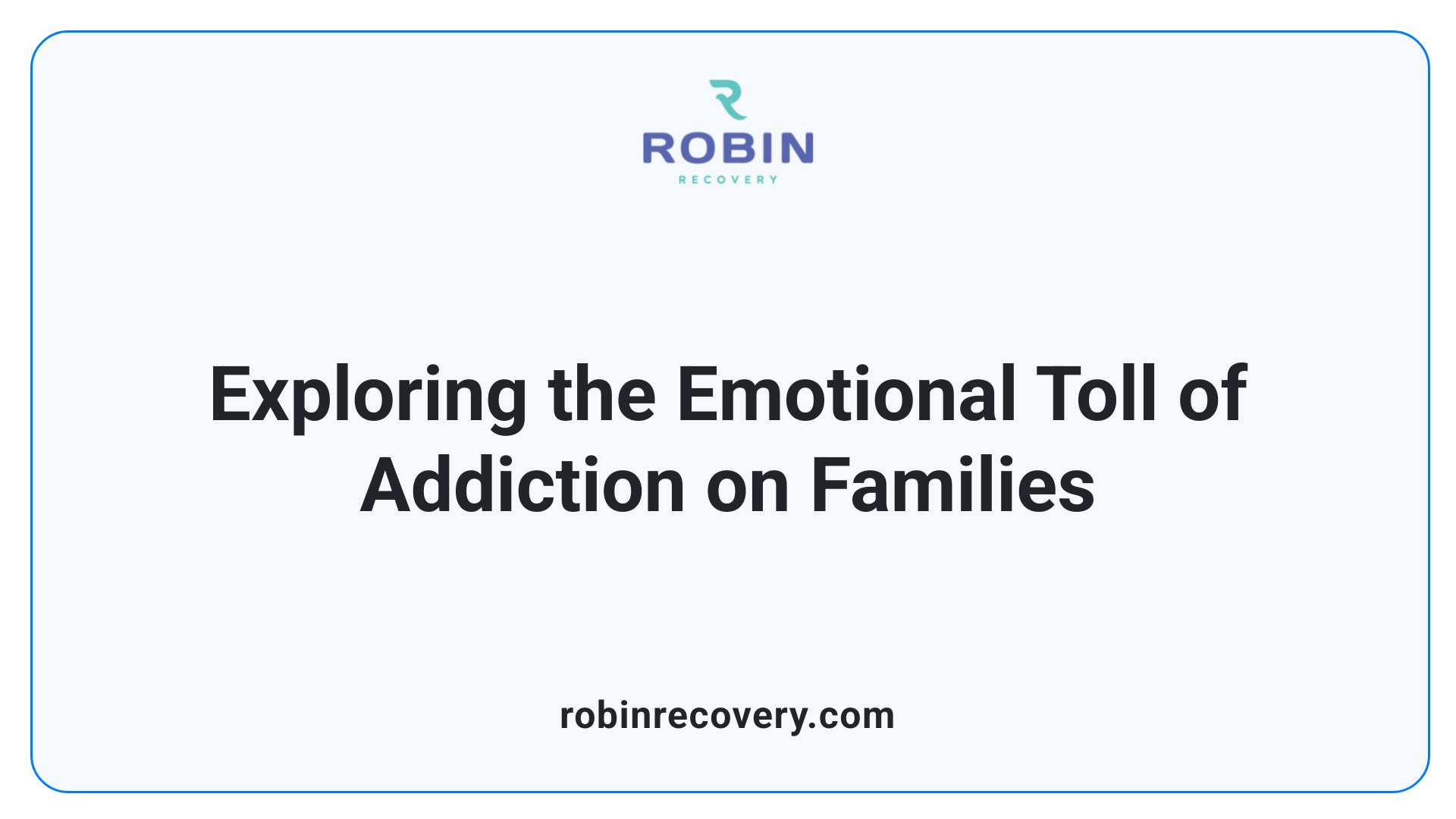How to Strengthen Family Bonds After Addiction

Introduction
Addiction doesn't just affect the individual grappling with substance use; it reverberates through their family, causing emotional pain, distrust, and dysfunction within family dynamics. As the recovering addict begins their journey towards a drug-free life, families are left to pick up the pieces, seeking harmony and normalcy. This pursuit of reconciliation after addiction involves understanding, patience, and guided strategies to mend fractured relationships. It's a challenging, yet rewarding process that paves the way for collective healing and stronger family ties.
Understanding the Impact of Addiction on Family Dynamics

How does living with an addict affect family members, and what are the potential traumatic impacts?
Living with an addict can create profound and enduring effects on family members. The emotional strain often translates into trauma, which may manifest as post-traumatic stress disorder (PTSD). This condition can lead to symptoms such as flashbacks, nightmares, anxiety, and depression, significantly disrupting daily life and overall well-being.
Family members may also exhibit avoidance behaviors and hyperarousal. Such reactions stem from the constant unpredictability and tension associated with addiction. The relentless stress of dealing with an addict can leave family members feeling overwhelmed and isolated.
Professional help is key to managing these challenges. Cognitive-behavioral therapy (CBT) can be instrumental in addressing PTSD symptoms. Medication may also play a supportive role in treatment. Additionally, families can benefit from practical strategies to cope, such as:
- Setting Boundaries: Protecting personal space and prioritizing mental health.
- Practicing Self-Care: Engaging in activities that promote physical and emotional wellness.
- Seeking Support: Connecting with others who understand their struggles can alleviate feelings of isolation.
Despite these challenges, engaging in family therapy can pave the way for healing, improving communication, and fostering healthy relationships within a complicated dynamic.
The Role of Family Therapy in Healing and Trust Building

Effectiveness of family therapy in addiction recovery
Family therapy plays a pivotal role in addiction recovery, particularly by addressing the collective impact of addiction on families. It provides a structured environment where family members can express their feelings and grievances openly. This is essential in healing the emotional wounds inflicted during active addiction.
In family therapy sessions, individuals learn to communicate effectively, a skill crucial for bridging gaps in relationships strained by substance use. Strategies include empathetic listening and expressing needs in a non-confrontational manner, helping restore broken trust. Moreover, family therapy educates all members about addiction, highlighting it as a disease rather than a moral failing, which fosters compassion and understanding.
Engaging in this therapeutic process encourages families to collectively develop strategies for preventing relapse, enhancing their ability to support one another through challenges.
Rebuilding trust through structured communication
Trust rebuilding after addiction is a gradual process that requires consistent effort from both the recovering individual and their family members. Family therapy provides a secure space for dialogue, allowing hurt feelings from the past to be addressed. Encouraging open communication helps families articulate their struggles and affirm their support for one another.
This open communication is vital to restoring emotional connections. Regular therapy sessions can guide families in setting healthy boundaries, a key step in promoting accountability while also protecting their own well-being.
Ultimately, the consistent practice of transparency and willingness to engage in difficult conversations leads to stronger, more resilient family units. Families can not only mend relationships but also develop a foundation of empathy and support, essential for sustaining recovery in the long run.
Strategies families can use to cope with a loved one's addiction
Families coping with a loved one's addiction can adopt several strategies to manage the situation effectively. They should recognize addiction as a disease rather than a personal failing, understanding that it impacts the entire family and requires a supportive approach. Maintaining open and honest communication when the loved one is sober, while expressing concern without judgment, is crucial. Families can also benefit from professional support, such as workshops and programs offered by organizations like Hazelden Betty Ford, which provide coping skills and resources for healthier relationships. Additionally, engaging in self-care and seeking support through groups like Al-Anon or Nar-Anon can help family members address their own emotional needs while supporting their loved one’s recovery journey.
Emphasizing Communication and Setting Boundaries
Importance of Effective Communication in Recovery
Effective communication is vital for families navigating the challenges of addiction recovery. It ensures that all members can express their feelings and concerns in a supportive environment, fostering understanding and empathy. Open dialogue helps to rebuild trust that may have been damaged during the addiction period. Family therapy plays a crucial role in enhancing these communication skills, allowing members to articulate their needs and listen actively to each other.
The Need for Establishing Healthy Boundaries
Establishing healthy boundaries is an essential component of recovery not only for the individual but also for their family. Boundaries protect loved ones from being unwittingly drawn into enabling behaviors that may hinder recovery. These boundaries can help maintain a supportive environment, where family members can demonstrate accountability without sacrificing their own well-being. For instance, loved ones must learn to identify when their actions may unintentionally support the addiction while simultaneously promoting a nurturing atmosphere that encourages recovery.
Can a Healthy Relationship Exist with an Addict?
Having a healthy relationship with an addict while they are still using substances is generally unattainable. The addiction often takes precedence over personal connections. However, if the addict seeks treatment and demonstrates a commitment to recovery, the possibility for rebuilding the relationship significantly increases. In such cases, setting clear boundaries becomes crucial. Loved ones must recognize enabling behaviors that perpetuate addiction, making supportive relationships critical for positive recovery outcomes. Engaging the family in therapy can help address underlying issues and facilitate healing. Ultimately, if the addict is unwilling to pursue recovery, loved ones might need to prioritize their own well-being and consider distancing themselves.
Developing Support Networks and Coping Mechanisms

The role of support groups in family recovery
Support groups are a vital resource for families impacted by addiction. These groups provide a safe space where members can share experiences, learn from others, and gain insights into coping with the challenges of a loved one's substance use disorder. Families learn that they are not alone and can find comfort in connecting with others facing similar struggles.
Engaging in support groups enhances understanding of addiction as a disease, fostering empathy and compassion towards the loved one’s challenges. This collective experience empowers families to practice healthier communication and address enabling behaviors that might undermine the recovery process.
Building a supportive environment for the recovering addict
Creating a positive environment is crucial for an individual in recovery. This includes establishing healthy boundaries and demonstrating mutual respect and trust among family members.
By actively participating in therapy, families can learn effective strategies for supporting their loved ones. Shared activities and open lines of communication help reinforce family bonds and create a nurturing atmosphere conducive to recovery.
Here’s a summary table of essential points about support networks:
Strengthening support networks enhances the recovery journey and fosters healthier family dynamics.
Self-Care and Resilience in Family Recovery

Importance of Self-Care for Family Members
Supporting a loved one through addiction recovery can be emotionally taxing. Family members often experience stress, anxiety, and feelings of helplessness. Prioritizing self-care is essential for their well-being.
Taking time for oneself allows family members to recharge, helping them to be more effective in their support roles. Healthy activities such as exercise, hobbies, and relaxation techniques can significantly improve mental and emotional health.
Building Resilience During the Recovery Process
Resilience is essential for navigating the ups and downs of recovery. It allows family members to adapt to challenging situations and maintain a positive outlook.
Engaging in support groups can foster connection and provide valuable coping strategies. Open communication within the family fosters understanding, reducing feelings of isolation, and encourages collective healing.
By focusing on self-care and resilience, families can create a supportive network essential for sustaining recovery and building healthier relationships.
Partnering in the Recovery Journey

What are the initial steps to overcoming addiction and building a meaningful, drug-free life?
The journey to overcoming addiction begins with recognition and commitment. Individuals first need to acknowledge their struggle and their desire for change. This initial step is often followed by exploring diverse treatment options, which can include detoxification, counseling, or participating in outpatient programs. Engaging with supportive friends and family members during this process is vital, as they provide the necessary encouragement and accountability to maintain sobriety.
It’s essential for individuals in recovery to identify potential stressors and triggers that may lead back to substance use. Developing healthy coping strategies plays a crucial role in this, allowing individuals to navigate life's challenges without resorting to drugs or alcohol. Education about addiction, especially when paired with an understanding of any co-occurring mental health disorders, can greatly facilitate recovery.
Failing to stick to a recovery plan should not be seen as a personal defeat but rather as a chance to learn and adapt. Recovery is a continual process, reflecting the need for patience, support, and a commitment to positive change.
How can shared activities contribute to healing?
Engaging in shared activities is an effective way to rebuild familial bonds after addiction. These activities foster connection and create new, positive memories, helping families to transition from a past filled with hardship to one brimming with hope and trust.
Some methods include:
- Participating in sober events: Attend community functions or support groups together, reinforcing a drug-free lifestyle.
- Shared hobbies: Start new hobbies, such as cooking healthy meals or exercising, that promote teamwork and mutual enjoyment.
- Celebrating milestones: Recognize recovery milestones collectively, strengthening family ties through celebrations of progress.
These interactions not only help solidify familial relationships but also create a network of support, crucial for sustaining recovery.
How do families create a collective healing process?
Creating a collective healing process involves recognizing addiction as a family disease, which affects all members. Family therapy is a vital tool in this journey, as it provides a structured environment for honest discussions and rebuilding trust.
During therapy sessions, family members learn to communicate effectively, addressing grievances and setting healthy boundaries. They gain insights into each other's experiences regarding addiction, fostering empathy and understanding.
Together, families can develop relapse prevention strategies, preparing to tackle future challenges and triggers collaboratively. Engaging in therapy not only aids in addressing past issues but also empowers family members to support one another, laying the groundwork for sustained recovery.
In summary, by coming together through shared activities and therapeutic processes, families can contribute significantly to each other’s healing journey, enhancing the support system so vital for recovery.
Conclusion
Strengthening family bonds after addiction is a multifaceted process that requires understanding, patience, and structured support. The journey involves opening up channels of communication, setting healthy boundaries, and engaging in therapeutic avenues that pave the way for forgiveness and healing. Family therapy and support groups are invaluable in facilitating this growth, offering families the tools to navigate challenges and build a future founded on trust and mutual support. As families engage in this collective healing, they not only mend past wounds but also lay the groundwork for a resilient and loving environment where every member can thrive post-addiction.
References
- National Helpline for Mental Health, Drug, Alcohol Issues - SAMHSA
- Family Therapy: Strengthening Relationships in Addiction Treatment
- Family Therapy in Addiction Treatment: Strengthening Bonds
- How To Navigate Family Relationships After Treatment
- Family Healing: Strengthening Bonds in Recovery
- Strengthening Family Bonds in Addiction Recovery | Impact IOP
- Chapter 3—Family Counseling Approaches - NCBI
- Rebuilding Relationships After Addiction: A Guide to Healing
- Family Involvement in Teen Drug Rehab: Why It Matters
